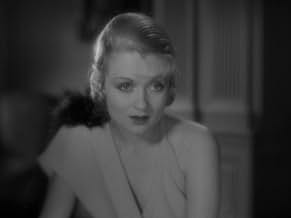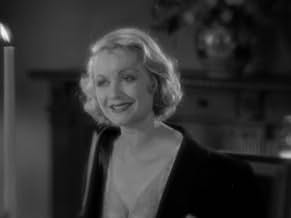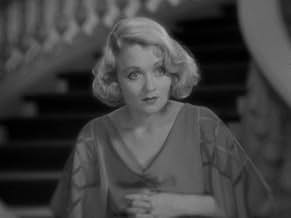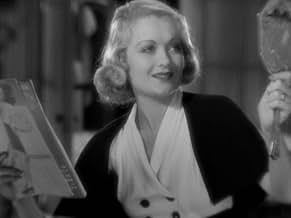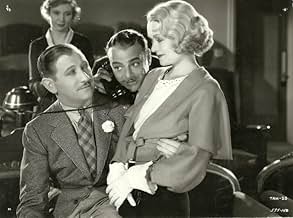AVALIAÇÃO DA IMDb
7,0/10
2,8 mil
SUA AVALIAÇÃO
Adicionar um enredo no seu idiomaThe career of a waitress takes off when she meets an amiable drunken Hollywood director.The career of a waitress takes off when she meets an amiable drunken Hollywood director.The career of a waitress takes off when she meets an amiable drunken Hollywood director.
- Indicado a 1 Oscar
- 1 indicação no total
George Reed
- Undetermined Secondary Role
- (cenas deletadas)
Alice Adair
- Undetermined Secondary Role
- (não creditado)
Eddie 'Rochester' Anderson
- James - Max's Butler
- (não creditado)
Sam Armstrong
- Undetermined Secondary Role
- (não creditado)
Zeena Baer
- Secretary to Julius Saxe
- (não creditado)
King Baggot
- Department Head
- (não creditado)
Gerald Barry
- John Reed - an Actor
- (não creditado)
Floyd Bell
- Undetermined Secondary Role
- (não creditado)
Veda Buckland
- Nana - Jackie's Nursemaid
- (não creditado)
Nicholas Caruso
- Chef at Brown Derby
- (não creditado)
Lita Chevret
- Actress Filming on Movie Set
- (não creditado)
Enredo
Você sabia?
- CuriosidadesThis film bears such a striking resemblance to Nasce uma Estrela (1937) that it is often considered "the original version" of that often remade classic. In fact, David O. Selznick, who produced both this film and Star is Born, was threatened with a lawsuit by this film's writers, claiming plagiarism.
- Erros de gravaçãoWhen the screen shows a newspaper gossip column, we can see part of an item relating a joke about a Jewish boy and a bird. Several months later, another gossip column shows the identical item.
- Cenas durante ou pós-créditosThere is a "by" credit to Gene Fowler and Rowland Brown after the title shows, but there is also a "screenplay by" credit to Jane Murfin and Ben Markson, without leaving any clear explanation or context as to what "by" actually means. But the reality was that Fowler and Brown wrote the real screenplay, with Murfin and Markson providing the continuity.
- ConexõesFeatured in David O. Selznick: 'Your New Producer' (1935)
- Trilhas sonorasThree Little Words
(1930) (uncredited)
Music by Harry Ruby
Part of a medley played during the opening credits
Avaliação em destaque
Another film that deserves a wider viewership and a DVD release, "What Price Hollywood?" looks at the toll Hollywood takes on the people who make it possible.
Adela Rogers St John wrote the Oscar-nominated story of a fading genius of a director, destroyed by drink, who launches one last discovery into the world. Lowell Sherman, himself both a director and an alcoholic, played the sad role that had been modeled, in part, on his own life. (Sherman's brother-in-law, John Barrymore, was also a model, as was the silent film director Marshall Neilan.) The divinely beautiful Constance Bennett plays the ambitious Brown Derby waitress who grabs her chance. Neil Hamilton, paired to great effect with Bennett that same year in "Two Against the World," plays the east-coast polo-playing millionaire who captures Bennett's heart without ever understanding her world.
George Cukor directed the film for RKO, and already the seeds of his directorial genius can be seen. Wonderful montages and double exposures chart Bennett's rise and fall as "America's Pal," and I've rarely seen anything as moving as the way Cukor presented Sherman's death scene, using quick shot editing, exaggerated sound effects and a slow motion shot. As startling as it looks today, one can only imagine the reaction it must have caused over 70 years earlier, before audiences had become accustomed to such techniques.
While the romantic leads are solid--Bennett, as always, especially so--and Gregory Ratoff is mesmerizing as the producer, hats must be doffed to Lowell Sherman for his Oscar-calibre performance. The slide from charming drunk to dissolute bum is presented warts and all, and a late scene in which the director examines his drink-ravaged face in the mirror is powerful indeed. It's hard to imagine what it must have been like for Sherman to play such a role and it was, in fact, one of the last roles he took for the screen, before concentrating on directing--then dying two years later of pneumonia.
When David O. Selznick made "A Star is Born" for United Artists five years later, four years after leaving RKO, the RKO lawyers prepared a point-by-point comparison of the stories, recommending a plagiarism suit--which was never filed. The later movie never credited Adela Rogers St John or any of the source material of "What Price Hollywood?" for its own screenplay, which was written by Dorothy Parker from, supposedly, an idea of Selznick's.
"What Price Hollywood?" is a great source for behind-the-scenes tidbits--Cukor fills the screen with images of on-set action (or inaction), with various crew waiting about as they watch the film-in-a-film action being filmed. This movie works as history and as innovation, but it also works on the most important level, as a well-told story.
Adela Rogers St John wrote the Oscar-nominated story of a fading genius of a director, destroyed by drink, who launches one last discovery into the world. Lowell Sherman, himself both a director and an alcoholic, played the sad role that had been modeled, in part, on his own life. (Sherman's brother-in-law, John Barrymore, was also a model, as was the silent film director Marshall Neilan.) The divinely beautiful Constance Bennett plays the ambitious Brown Derby waitress who grabs her chance. Neil Hamilton, paired to great effect with Bennett that same year in "Two Against the World," plays the east-coast polo-playing millionaire who captures Bennett's heart without ever understanding her world.
George Cukor directed the film for RKO, and already the seeds of his directorial genius can be seen. Wonderful montages and double exposures chart Bennett's rise and fall as "America's Pal," and I've rarely seen anything as moving as the way Cukor presented Sherman's death scene, using quick shot editing, exaggerated sound effects and a slow motion shot. As startling as it looks today, one can only imagine the reaction it must have caused over 70 years earlier, before audiences had become accustomed to such techniques.
While the romantic leads are solid--Bennett, as always, especially so--and Gregory Ratoff is mesmerizing as the producer, hats must be doffed to Lowell Sherman for his Oscar-calibre performance. The slide from charming drunk to dissolute bum is presented warts and all, and a late scene in which the director examines his drink-ravaged face in the mirror is powerful indeed. It's hard to imagine what it must have been like for Sherman to play such a role and it was, in fact, one of the last roles he took for the screen, before concentrating on directing--then dying two years later of pneumonia.
When David O. Selznick made "A Star is Born" for United Artists five years later, four years after leaving RKO, the RKO lawyers prepared a point-by-point comparison of the stories, recommending a plagiarism suit--which was never filed. The later movie never credited Adela Rogers St John or any of the source material of "What Price Hollywood?" for its own screenplay, which was written by Dorothy Parker from, supposedly, an idea of Selznick's.
"What Price Hollywood?" is a great source for behind-the-scenes tidbits--Cukor fills the screen with images of on-set action (or inaction), with various crew waiting about as they watch the film-in-a-film action being filmed. This movie works as history and as innovation, but it also works on the most important level, as a well-told story.
- klg19
- 29 de ago. de 2005
- Link permanente
Principais escolhas
Faça login para avaliar e ver a lista de recomendações personalizadas
- How long is What Price Hollywood??Fornecido pela Alexa
Detalhes
- Data de lançamento
- País de origem
- Idiomas
- Também conhecido como
- What Price Hollywood?
- Locações de filme
- Empresa de produção
- Consulte mais créditos da empresa na IMDbPro
Bilheteria
- Orçamento
- US$ 411.676 (estimativa)
- Tempo de duração1 hora 28 minutos
- Cor
- Proporção
- 1.37 : 1
Contribua para esta página
Sugerir uma alteração ou adicionar conteúdo ausente


